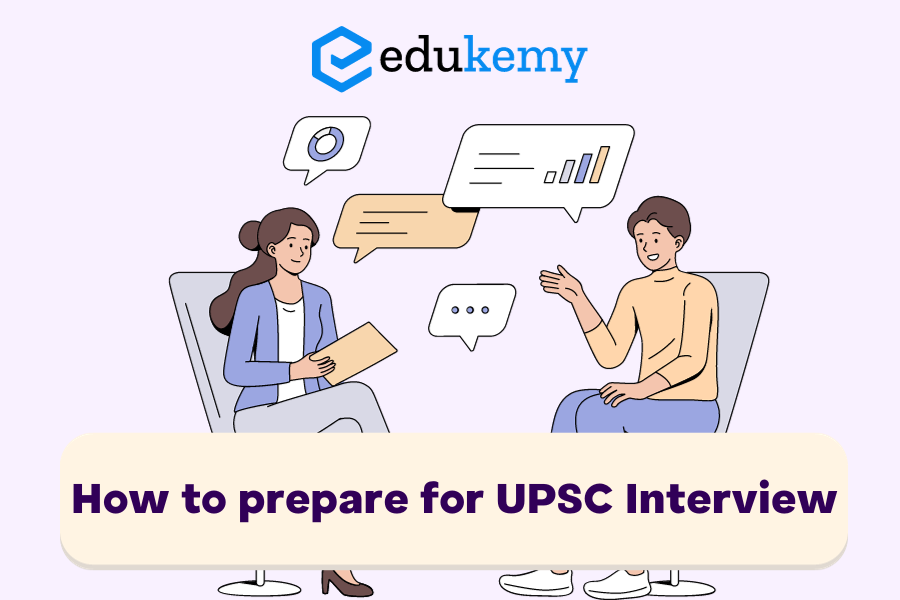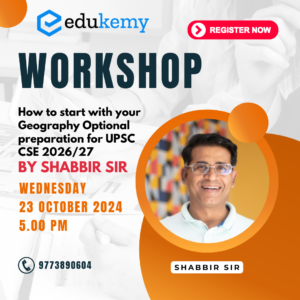
UPSC Interview or the personality test is the last of the rounds that an aspirant must face before making it to the final destination. Out of the 2075 marks, the IAS interview carries a weightage of 275 marks, creating a massive difference while releasing the merit rank list. Therefore, “How to prepare for IAS interview” is one of the most frequently asked questions from the aspirants even before they clear the Preliminary examination.
Students who believe in scoring maximum marks in the mains examination and becoming complacent about the personality test might be because Mains Examination has a weightage of around 87% of the total marks. But aspirants should be aware of the fact that during the release of the merit list, even a single mark difference can create a huge difference in the rank list.
Those who clear the Mains Examination will receive a Detailed Application Form (DAF) which will become the reference point where you will be asked questions. Therefore, it is highly advisable to fill the form with proper intelligence to make things easier for yourself during the interview.
Types of question
When talking about the types of question that is being asked in the IAS interview, can be divided into 4 broad categories:
- Profile-based question: Any interview starts with the panelist analyzing and retrieving the information from the aspirants. Generally, this category involves basic questions based on your background and information about yourself, including name, birthplace, education pursued, etc.
- Personality and Behavioral-based questions: There’s a considerable difference between profile-based and personality-based questions. These questions will assess your attitude and behavior according to the answers you present. The candidates need to have a positive attitude and an active posture to represent themselves.
- Situational Based Questions: In situational-based questions, board members would gauge the candidates’ level of thinking and credibility while answering those questions. A real-life scenario will be put up where the candidates have to give a compelling answer to prove themselves credible enough to become a bureaucrat.
- General Awareness Questions: While pointing out certain tips for UPSC preparation in this article, frequently it has been advised to regularly read newspapers and editorials to ace the Prelims and Mains Examination and answer specific questions that would be put forth in the interview. It is expected from a future bureaucrat to be aware of current affairs and have personalized views on them.
Tips for IAS Interview Preparation
Below there are some valuable tips that should be kept in mind during the IAS interview phase:
- Stable and Calm mind: While an interview panelist will expect the candidates to give an effective reply quickly, they require a calm mind to process their thoughts and provide an appropriate answer. A cluttered mind would lead you to slower thinking levels.
- DAF preparation: Most of the answers will revolve around your DAF, so it’s advisable to add credibility to your given answers in the interview. Thoroughly read and gain clarity over the submitted written information.
- Credible and Authentic Answers: The panelist who will be taking the interviews will have immense experience and have interviewed thousands of candidates before. The more reasonable and authentic answers you give, the more positive chance you will create for yourself. Never try to weave false answers to gain superiority.
- Optimistic and Positive Answers: While assessing your qualities, panelists would judge the quality of words and thoughts you frame while answering the questions. How grim maybe the situation always tries to keep an optimistic view to impress the panelists.
- Read Trending and Contemporary Topics: It is important to prepare important topics to reference while framing your thoughts and adding data while giving answers. In addition, it’s important to showcase the wisdom and knowledge that you have acquired within years.
- Effective Dressing and Posture: The better you present yourself on the interview day will only attract points for your merit list. It’s essential to have a positive attitude and active posture.
Frequently Asked Questions (FAQs)
Q: What is the significance of the UPSC interview in the selection process, and how should I approach its preparation?
A: The UPSC interview, also known as the Personality Test, plays a crucial role in the final selection. This FAQ should guide candidates on understanding the importance of the interview and provide insights into the UPSC interview panel’s expectations. Tips on how to present oneself confidently, communicate effectively, and express opinions coherently could be included.
Q: What topics should I focus on for the UPSC interview, and how can I stay updated on current affairs?
A: This question should guide candidates on the specific areas of knowledge they should prioritize for the interview. It should also provide advice on staying informed about current events, government policies, and socio-economic issues. Emphasize the importance of reading newspapers, following reputable news sources, and understanding the socio-political context.
Q: How can I improve my communication and interpersonal skills for the UPSC interview?
A: Effective communication is a key aspect of the UPSC interview. This FAQ should offer guidance on improving verbal and non-verbal communication skills. Tips on practicing mock interviews, participating in group discussions, and honing interpersonal skills could be valuable for candidates.
Q: What are the common mistakes to avoid during the UPSC interview, and how can I handle tricky questions?
A: Candidates often make specific errors during the interview process. This FAQ should provide insights into common mistakes and offer strategies to avoid them. It should also guide candidates on handling challenging or unexpected questions with grace, demonstrating adaptability and critical thinking.
Q: Is there a recommended dress code for the UPSC interview, and how can I make a positive first impression?
A: The first impression is crucial in any interview. This question should address the importance of a professional appearance and suggest appropriate attire for the UPSC interview. Additionally, it can offer tips on body language, maintaining eye contact, and projecting confidence to leave a lasting positive impression on the interview panel.
In case you still have your doubts, contact us on 9811333901.
For UPSC Prelims Resources, Click here
For Daily Updates and Study Material:
Join our Telegram Channel – Edukemy for IAS
- 1. Learn through Videos – here
- 2. Be Exam Ready by Practicing Daily MCQs – here
- 3. Daily Newsletter – Get all your Current Affairs Covered – here
- 4. Mains Answer Writing Practice – here

